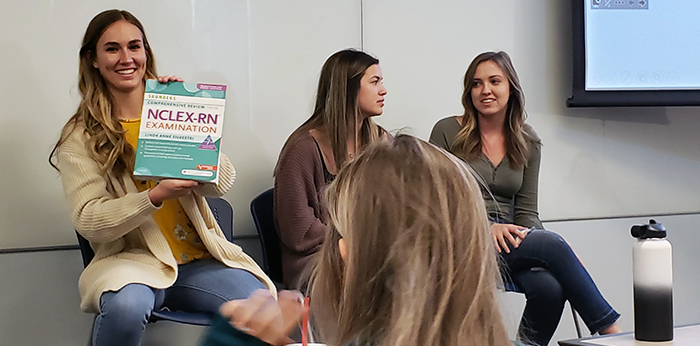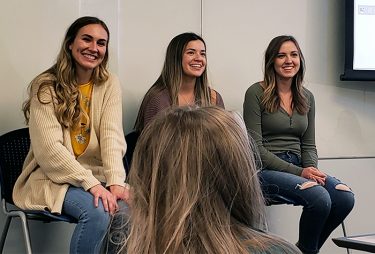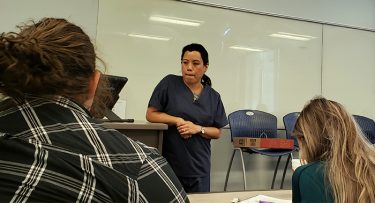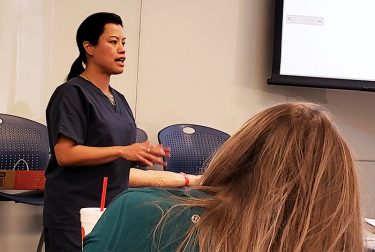
By Lana Sweeten-Shults
GCU News Bureau
Nursing students eat, sleep and breathe pathophysiology, pharmacology and health assessments. But they also do venture out of the classroom and into the sunlight.
“I went to the movies yesterday,” said Sarah Aguirre, a Level 2 Grand Canyon University nursing student who also finds her Zen by taking time out from her intense, hyper-focused nursing studies to do a little hot yoga.

Kacey Butrovich somehow squeezes intramural sports in between nursing courses and clinical rotations, when students go into the field and train in actual nursing environments for 12-hour shifts. She goes to church and listens to Christian music to center her when she steps away from the nursing rigor.
And Maddie McLuen continues to serve as a Life Leader -- GCU students who provide Christian leadership on campus -- though she can’t always make Chapel.
“It’s a common stereotype that you don’t have a social life,” Aguirre said.
But, rest assured, they do.
It was just one of the topics the trio of students, all from the same cohort in the College of Nursing and Health Care Professions, covered in their talk last week in Dr. Mark Wireman’s pathophysiology class. They spoke to pre-nursing students, many of whom already have been accepted into the GCU nursing program.
“They’re overwhelmingly excited,” Wireman said. “But they are a little nervous, too.”
To quell some of those fears, the College of Science, Engineering and Technology associate professor invited current nursing students to share their experiences with his class. He wanted to prepare them for the next phase in their career at GCU.

“I thought it would be a nice activity to help bridge the transition of a pre-nursing student becoming a nursing student,” Wireman said.
Not that nursing students can squeeze in everything they want to do.
McLuen said friends and family have suggested, “Let’s go shopping!”
But, “I had to say no,” she said.
“How do you maintain your family relationships and friendships?” one student asked.
Aguirre, who’s from Rancho Cucamonga, Calif., said she still finds time to call her family but now, instead of every day, it might be once a week. They simply understand that her life has gotten busy.
It's something friends just have to understand, too. Aguirre, after all, often studies on Friday and Saturday nights and, after an 8-to-5 day in nursing school on weekdays, takes a little break for dinner and hits the books again. She tries to wind down by 10 or 11 p.m. so she can get enough sleep before starting over again the next day.
“But there’s 21 students in a cohort, and you have 21 new best friends,” Butrovich said, all friends you lean on to get you through.
The nursing students also spoke about transitioning academically into the nursing program.
Butrovich said “getting help from people at a level above you is always really helpful to me.”
Aguirre advised those entering the program to not be afraid to approach their instructors.

“I was kind of intimidated to go to the teachers. … The setting kind of changes when you’re in the program. I wish I knew I could just go to the nursing professor.”
They also spoke about a day in their lives: They take two classes a day -- each class is offered once a week, and each is four hours long. Level 1 nursing students take four courses – health assessment, introduction to nursing, pharmacology and Foundations of Nursing – along with two labs, each of them also four hours long.
“Always make sure you’re eating, hydrating and sleeping,” Aguirre advised.
One pre-nursing student wondered about the study methods the three nursing students use.
“It’s a one-exam-at-a-time kind of thing,” McLuen said, admitting, “It’s a lot of studying.”
She’ll meet up with fellow nursing students, too, to review what they learned in class.
Butrovich makes flashcards, such as drug flashcards, to help her in pharmacology class.
“For health assessments, really focus on the bolded stuff,” she advised.
Aguirre’s method: She takes the class Microsoft PowerPoint and converts that to a Word document outline. She also highlights what the instructor says in lectures in blue.
“It’s all about adjusting your study habits,” Aguirre said, noting how instructors don’t give students study guides.
As for grades, Butrovich, Aguirre and McLuen spoke about PBAs, or performance-based assessments. The passing score on a PBA is 80%, Butrovich said. Students who don’t meet that minimum score go to remediation, which means meeting with the instructor to discuss how to improve that score.
“I didn’t pass two of my PBA’s,” said Butrovich, though she has learned to look at the bigger picture. “It’s not the end of the world, but it feels like it.”
Students have more than one chance to pass a PBA, and it’s important to realize that not knowing what you’re supposed to know as a nurse could mean something dire for a patient.
“It’s serious stuff,” Butrovich said.
They also talked about clinical rotations, which have been McLuen's favorite part of nursing school so far. She works with real people and isn’t just reading about them in a book.
Butrovich said, “It puts you in the mindset of why we are doing this – to serve people, to love people. It’ gives me so much fulfillment in clinicals. I think, ‘OK, this is what my life is going to look like.”
“What we’re trying to get you to do is, the whole point of you being here today is refocusing your energy. … It’s a mindset,” said Dr. Maria Quimba, Associate Dean of the College of Nursing and Health Care Professions, who also stopped by the class.

Quimba echoed Butrovich’s sentiment about how a lower-than-expected grade isn’t the end of the world.
“None of your patients will ever ask you what school you went to or what grade you got, but they will expect you to give your best, apply what you have learned, and provide the best care possible. … Your job in the future is not going to be about pushing paper, it's about caring for people and advocating for them,” Quimba said.
She shared with students the first time she lost a patient.
It was on Valentine’s Day and the patient was about to be discharged. When Quimba returned to the room, the patient was flat on the floor. He had an embolism that traveled to his heart and caused his death.
Quimba was the one who had to tell the patient’s family that he had passed away.
“I think to myself, 'What if I had seen something?' These are the things that go through my mind.”
Even at the grocery store, she said, running through her mind are things that perhaps only nurses or others in the medical and health professions might see: “This person’s a smoker, or, hey, this person is not getting enough Vitamin D.”
“Everything you learn is valuable,” Quimba said. She quickly learned that being in nursing "is not a joke; people die," but what gets her through is knowing she did everything she could and the fact that "part of being in this profession is you have each other."
But not everything is dire. She says she has plenty of heart-warming stories to tell, too.
“I was very pleased to see our students happy and well rested … realizing that there’s life at the end of the tunnel.”
Quimba said the College of Nursing and Health Care Professions collaborates often with CSET on course development, particularly in the sciences, as well as career development initiatives. Her college works closely with other colleges, too, such as the Colangelo College of Business.
“The unique environment at GCU is very conducive to collaborations across colleges and departments. Our close working relationships allow us to be very intentional about supporting students and developing learning opportunities that are very specific to their needs.”
Quimba relayed that, personally, she’s asked often to talk about her vocation and share her experiences as a nurse and administrator.
“Our college looks for every opportunity to meet with students. … We’ve found that speaking with those interested in health care early in the academic journey helps students better distinguish the right path for them while preparing them for the hard work of becoming students in a very rigorous clinical program.”
Emily Deiters, a sophomore prenursing student who wants to be a pediatric oncology nurse, was one of the students at the presentation.
She said she knew becoming a nurse would be hard, and she imagines she will be like a deer in the headlights early on. The thought of what’s ahead in nursing school is “nerve-wracking,” she said.
But, in the end, she also said it was comforting to hear from Butrovich, Aguirre and McLuen, who share the same beliefs as her – they all spoke about their faith and their calling to be a nurse.
“To see a smile on their faces, that helped,” she said.
GCU senior writer Lana Sweeten-Shults can be reached at [email protected] or at 602-639-7901.
Related content:















